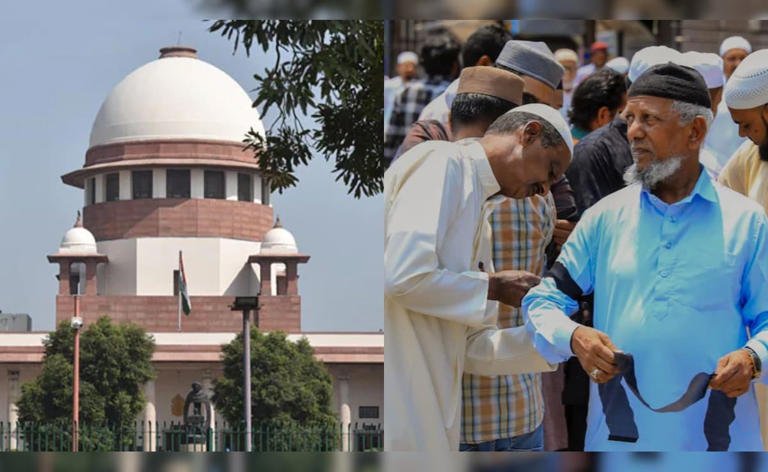Big Supreme Court Order On Waqf Amendment Act, Key Provisions Stayed
The Supreme Court of India has recently delivered a significant interim order on the Waqf (Amendment) Act, staying the operation of certain key provisions that have sparked intense debate across political, social, and legal circles. The ruling has brought temporary relief to petitioners who had challenged the constitutional validity of the amendments, while also reopening discussions on the delicate balance between community rights, religious endowments, and constitutional safeguards.
Background of the Waqf Amendment Act
The Waqf Act, 1995, governs the administration of waqf properties across India. Waqf, in Islamic law, refers to a permanent dedication of property—usually for religious, charitable, or community purposes. Over the years, concerns regarding the mismanagement of waqf properties, lack of transparency, and disputes over ownership have led successive governments to amend the Act.
The Waqf (Amendment) Act, 2024 (as recently passed by Parliament) was pitched as a reform-oriented law aimed at curbing irregularities, introducing stricter compliance, and bringing greater accountability to the management of waqf properties. However, critics argued that several provisions undermined the rights of stakeholders, diluted community autonomy, and granted sweeping powers to authorities without adequate safeguards.
It was against this backdrop that multiple petitions were filed before the Supreme Court, questioning the constitutional validity of the amendments.
Supreme Court’s Interim Order
A Bench of the Supreme Court, while hearing the matter, stayed the implementation of certain controversial provisions of the Amendment Act. The Court observed that prima facie, these provisions raised serious concerns relating to fundamental rights, property rights, and principles of natural justice.
The stay is not a final verdict but an interim measure, ensuring that potential harm does not occur while the Court examines the matter in detail. The Bench has also issued notices to the Union Government and the Central Waqf Council, seeking their response.
Key Provisions Stayed by the Supreme Court
According to reports, the Court stayed the operation of the following provisions:
- Unilateral Power of Waqf Boards to Declare Property as Waqf
- The amendment allowed Waqf Boards to declare any disputed property as waqf land, even without adequate verification or consultation with stakeholders.
- Critics feared this could lead to arbitrary encroachment and prolonged litigation.
- Restriction on Civil Court Jurisdiction
- The Act barred civil courts from entertaining disputes related to waqf properties, vesting exclusive powers in Waqf Tribunals.
- Petitioners argued that this undermined judicial remedies available to citizens under ordinary law.
- Centralisation of Powers
- Provisions expanding the powers of the Central Waqf Council, including oversight of state waqf boards, were put on hold.
- Opponents said this diluted federal principles and reduced state autonomy.
- Stricter Eviction Clauses
- The amendment introduced stringent eviction mechanisms against occupants of waqf land, without providing adequate time or redressal.
- The Court found merit in the argument that such provisions violated due process.
Arguments of the Petitioners
Petitioners from different communities and legal experts argued that:
- The right to property, though not a fundamental right, is still protected under Article 300A of the Constitution. Arbitrary deprivation of property through unilateral waqf declarations violated this principle.
- The Act curtailed the right to access justice, as civil courts’ jurisdiction was barred, leaving citizens with no effective recourse.
- Excessive powers to the executive and boards were contrary to the constitutional doctrine of checks and balances.
- Certain provisions amounted to violation of Articles 14, 19, and 21, which guarantee equality, freedom, and protection of life and personal liberty.
Government’s Defence
On the other hand, the Union Government has defended the amendments, stating that:
- The Act was designed to prevent the misuse of waqf properties, which are often subject to encroachment and fraud.
- Waqf Boards and Tribunals were better placed to handle such disputes as specialised bodies with subject knowledge.
- Central oversight was necessary to bring uniformity, transparency, and accountability across states.
- Safeguards had been built into the law, and fears of misuse were “exaggerated.”
The government has assured the Court that it would provide detailed justification for the amendments in the next hearing.
Broader Implications
The Supreme Court’s order has far-reaching consequences beyond the immediate suspension of certain provisions:
- Legal Precedent – The case will likely set an important precedent on the scope of legislative power in managing religious and charitable endowments.
- Political Impact – The ruling has already sparked strong political reactions, with opposition parties terming it a “victory for democracy and constitutional rights.”
- Community Concerns – Many Muslim organisations have welcomed the stay, saying it protects community rights until a final verdict is delivered.
- Federalism Debate – The order revives the debate on the balance of power between the Centre and states in managing religious institutions.
Next Steps
The Supreme Court has directed the matter to be listed for detailed hearing in the coming weeks. Both the Union Government and the petitioners will submit comprehensive arguments. Till then, the stayed provisions cannot be enforced.
The Supreme Court’s intervention in the Waqf Amendment Act reflects the judiciary’s crucial role as the guardian of constitutional principles. While the government argues that reforms are essential to safeguard waqf assets, critics contend that such reforms cannot come at the cost of fundamental rights and due process.
As the matter proceeds, the Court’s final verdict will be closely watched not only for its immediate impact on waqf management but also for its broader implications on the relationship between law, religion, and governance in India.
For now, the stay order offers a breather to those who feared arbitrary implementation, ensuring that constitutional scrutiny remains the touchstone for all legislative reforms.





